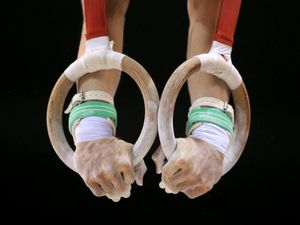British Gymnastics boss insists welfare is key to medal success
Sarah Powell says a 40-point ‘Reform ’25’ plan will address recommendations made by Anne Whyte KC across four key areas of safeguarding.

British Gymnastics chief executive Sarah Powell has stressed that success and safeguarding are not mutually exclusive as the governing body plots its path towards regaining the trust of participants and parents in the wake of the damning criticism issued by the Whyte Review in June.
Powell says a 40-point ‘Reform ’25’ plan published on Monday will address recommendations made by Anne Whyte KC across four key areas of safeguarding, complaints handling, standards and education, and governance and oversight, and yield tangible evidence of change within the next two years.
Whyte’s damning 306-page review accused British Gymnastics of enabling a toxic culture that prioritised profit over the well-being of young athletes, and encouraged an era in which they were subjected to shocking levels of emotional and physical abuse.
Powell is adamant that the sport must continue to move away from prioritising medals, and with it the lure of additional funding, in favour of establishing a less performance-driven environment which conversely will better equip athletes for success on the world stage.
Powell told the PA news agency: “Before we talk about medals and performance we need to be talking about the welfare and well-being of our gymnasts.
“I think if you make the welfare and well-being of athletes central, they will be mentally and physically well prepared to go on and achieve international success.
“We cannot focus on the outcome because we cannot control it. What we can do is focus on making sure they perform to the best of their ability by being in the best condition they can possibly be in – and that means we have to look after them all the way through the process.
“I’m not saying that we’re not ambitious and we don’t want to see our gymnasts winning medals at the World Championships in Liverpool. What we want to make sure is that we have done it in the right way, and we have provided them with the right support both mentally and physically.”
The ‘Reform ’25’ document has promised “zero tolerance” to cases of emotional, physical and sexual abuse, with more transparent complaints procedures and with the names of banned coaches made available via the governing body’s official website.
Gymnasts and their parents will be fully involved in establishing their training programmes and workloads, and Powell said subjective considerations of what may constitute acceptable training methods will be abolished in favour of clearly established limits.
“We need to remove that subjectivity – we need to be really clear and move from guidelines around stretching, weight management and nutrition, to policies that need to be adhered to at all times,” added Powell.
“This will be about education and making sure people understand what is expected of them, supporting the development and confidence of coaches to be able to enact those policies so they are clear on what is acceptable and what is not.

“It is not about what is acceptable to one gymnast not being acceptable to the other. There needs to be clear boundaries in place.”
British Gymnastics says it will ensure all welfare-related complaints are independently investigated and communicated promptly to the complainants.
To that end it has appointed an independent adviser, the former Olympic rowing silver medallist Catherine Bishop, to oversee the governing body’s implementation of its impending reforms.
“We’re delighted to have Dr Catherine Bishop on our oversight board,” added Powell.
“She brings not only an external view, but a wealth of experience around values, culture and leadership, and she is already bringing her insight into challenging the way we develop ‘Reform ’25’.”
Reacting to the announcement, Gymnasts for Change said it was a “welcome first step” but said further elements were required – calling for an independent body to be created to provide oversight, a greater focus on the grassroots level, and attention on mental health and eating disorders.
A spokesperson for Gymnasts for Change said: “The Reform 25 report is a welcome first step in addressing the pervasive abuse experienced by gymnasts for decades.
“We’re pleased to see that British Gymnastics recognise the significant cultural change needed to make the sport we love safe for gymnasts now and in the future.
“But this cannot happen without the resolution of the existing 37 legal actions which have suffered from a lack of transparency and sluggish pace by British Gymnastics.”





